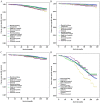Marital status independently predicts prostate cancer survival in men who underwent radical prostatectomy: An analysis of 95,846 individuals
- PMID: 29552113
- PMCID: PMC5840566
- DOI: 10.3892/ol.2018.7964
Marital status independently predicts prostate cancer survival in men who underwent radical prostatectomy: An analysis of 95,846 individuals
Abstract
Marital status is an independent prognostic factor for survival in several types of cancer, but has not been fully studied in prostate cancer (PCa). A total of 95,846 men diagnosed with PCa were treated with radical prostatectomy (RP) between 2004 and 2009 within 18 Surveillance, Epidemiology and End Results registries. Survival curves were generated using Kaplan-Meier estimates and differences in survival were assessed using the log-rank test. Cox regression models were used to assess the impact of marital status on survival outcomes. The results demonstrated that the 8-year cancer-cause specific survival (CSS) rate of married men was higher than unmarried individuals. Further analyses revealed that divorced/separated men had a higher proportion of high Gleason scores (GS) PCa at diagnosis [hazard ratio (HR), 1.12; P=0.007] and those patients had the worst survival outcomes independent of age, ethnicity, grade, stage and sequence number [HR, 1.61; 95% confidence interval (CI), 1.34-1.93]. Interestingly, it was observed that CSS among divorced/separated men decreased as the GS increased (GS≤6: HR, 2.5; GS=7: HR, 1.71; GS≥8: HR, 1.50; all P<0.05). Apart from that, no significant differences in CSS were observed in those who had never been married (HR, 1.20) or were widowed (HR, 1.13) relative to the married group. The results of the present study support the hypothesis that marital status is an independent prognostic factor among men with PCa who underwent RP. It was demonstrated that the mortality rates of divorced or separated men with PCa were significantly greater compared with the other groups. A further understanding of the potential associations among marital status, psychosocial factors and survival outcomes may help in developing novel, more effective methods of treating different groups of patients with PCa.
Keywords: Epidemiology and End Results; Gleason score; Surveillance; marital status; prostate cancer; radical prostatectomy.
Figures

References
LinkOut - more resources
Full Text Sources
Other Literature Sources
